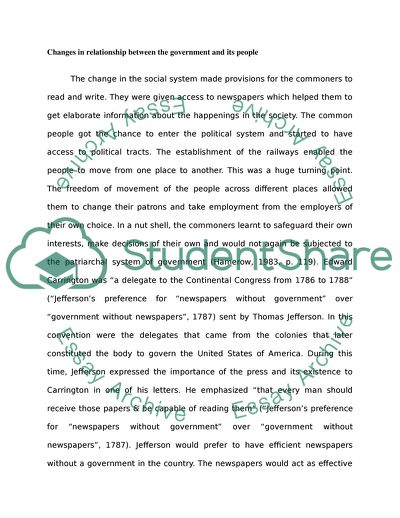Cite this document
(Journalism in the USA of the 19th Century Essay Example | Topics and Well Written Essays - 2000 words, n.d.)
Journalism in the USA of the 19th Century Essay Example | Topics and Well Written Essays - 2000 words. https://studentshare.org/journalism-communication/1792510-the-basis-of-our-government-being-the-opinion-of-the-people-the-very-first-object-should-be-to-keep-that-right-and-were-it-left-to-me-to-decide-whether-we-should-have-a-government-without-newspapers-or-newspapers-without-a-government-i-should-not-h
Journalism in the USA of the 19th Century Essay Example | Topics and Well Written Essays - 2000 words. https://studentshare.org/journalism-communication/1792510-the-basis-of-our-government-being-the-opinion-of-the-people-the-very-first-object-should-be-to-keep-that-right-and-were-it-left-to-me-to-decide-whether-we-should-have-a-government-without-newspapers-or-newspapers-without-a-government-i-should-not-h
(Journalism in the USA of the 19th Century Essay Example | Topics and Well Written Essays - 2000 Words)
Journalism in the USA of the 19th Century Essay Example | Topics and Well Written Essays - 2000 Words. https://studentshare.org/journalism-communication/1792510-the-basis-of-our-government-being-the-opinion-of-the-people-the-very-first-object-should-be-to-keep-that-right-and-were-it-left-to-me-to-decide-whether-we-should-have-a-government-without-newspapers-or-newspapers-without-a-government-i-should-not-h.
Journalism in the USA of the 19th Century Essay Example | Topics and Well Written Essays - 2000 Words. https://studentshare.org/journalism-communication/1792510-the-basis-of-our-government-being-the-opinion-of-the-people-the-very-first-object-should-be-to-keep-that-right-and-were-it-left-to-me-to-decide-whether-we-should-have-a-government-without-newspapers-or-newspapers-without-a-government-i-should-not-h.
“Journalism in the USA of the 19th Century Essay Example | Topics and Well Written Essays - 2000 Words”. https://studentshare.org/journalism-communication/1792510-the-basis-of-our-government-being-the-opinion-of-the-people-the-very-first-object-should-be-to-keep-that-right-and-were-it-left-to-me-to-decide-whether-we-should-have-a-government-without-newspapers-or-newspapers-without-a-government-i-should-not-h.


